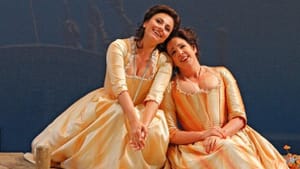Stay in the Loop
BSR publishes on a weekly schedule, with an email newsletter every Wednesday and Thursday morning. There’s no paywall, and subscribing is always free.
Welcome back, James
Levine conducts ‘Così fan tutte’ at the Met

When James Levine returned to the Metropolitan Opera after a long siege of back problems, no one knew how much of a workload he could shoulder. He was booked for only three operas this season. The first was an old favorite of his, Mozart’s Così fan tutte.
The production was broadcast last week in HD in cinemas, demonstrating that Levine is back in full force. He brought out subtleties of phrasing and dynamics, especially in the complex sextet that concludes the first act. Levine also was able to coach a youngish cast and elicit some wondrous performances.
Although Levine is not a stage director (Lesley Koenig had that title, revived by Robin Guarino), he instructed his cast in motivation and acting as well as singing their roles — a tough assignment, given this opera’s sexist and incongruous plot.
In the story, you will recall, a worldly older man tells two young soldiers that their fiancées (who are sisters) won’t be faithful to them. The soldiers accept a bet and pretend to go off to war but immediately return in disguise to woo and seduce each other’s fiancées. At the end, the ladies marry their original intended husbands.
You might wonder: How could they do that?
Difficult aria
The Met’s current staging doesn’t concern itself with that question. It doesn’t wink at the script, nor does it try to explain how the women could fail to recognize their lovers who simply changed clothes and put on fake mustaches. Instead, the cast goes along with Lorenzo Da Ponte’s libretto, which assumed that all women were inconstant and therefore urged men to accept this inconsistency with good nature. Levine’s players found humanity in the reactions each of them display during their vicissitudes.
Susanna Phillips as Fiordiligi, for example, showed the anxiety of a young woman who fears her fiancé may be killed in battle or may change his mind about marriage while he’s away, thus leaving her alone.
Phillips was sympathetic throughout, and her singing was lovely, especially in the moving Per pietà (“Forgive me”) in Act II. Her Come scoglio (“Strongly founded”) in Act I — a fiendishly difficult aria, going down to A below middle C and including sudden upward leaps of nine notes— lacked just a bit of power in the low notes. Phillips and the mezzo Isabel Leonard as Dorabella — the less-likable character, too quick to run off with a new lover — displayed warm tone and blended their voices beautifully.
Sore thumb
Matthew Polenzani, abandoning his forceful manner of some other weightier roles, sang Ferrando softly and elegantly, with the proper clarity of articulation in rapid passages. Thankfully, Levine and Polenzani included the tenor’s difficult, often-cut Ah! lo veggio aria in Act II. The Russian baritone Rodion Pogossov acted and sang convincingly as Guglielmo. Bass-baritone Maurizio Muraro made a good-natured Alfonso with a subtle voice.
Sticking out like a sore thumb was Danielle de Niese as the maid Despina — constantly mugging, with exaggerated bug-eyed facial expressions, and flouncing around the stage with lunges and gestures.
The singers and the orchestra used gradations of volume and tempo to bring variety and vivacity to Mozart’s elegant score. That was sufficient to make you forget the problems of the plot and treasure the performances instead.
What, When, Where
Così fan tutte. By W. A. Mozart and Lorenzo Da Ponte; James Levine conducted. Through May 8, 2014 at the Metropolitan Opera House, Lincoln Center, New York. April 26 and April 30 in cinemas. 212-362-6000 or metopera.org.
Sign up for our newsletter
All of the week's new articles, all in one place. Sign up for the free weekly BSR newsletters, and don't miss a conversation.

 Steve Cohen
Steve Cohen